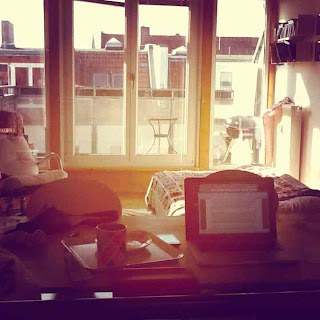What happened?
The rabbit hutch of my creative process is fouled by dirty life habits. And I'm cleaning it up.
If you're a follower of this blog, you'll probably know my theatre shows and novel-writing. Epic challenges in short timeframes, usually with exciting outcomes. But every time I did a creative project, I ended up burnt out. I love deadlines, and worked with a kind of brutal, obsessive energy and determination. I got things done, and fast - but, as my wise friend and director Sara Kewly Hyde advised: "Controversially, Laura, getting things done is not always the most important thing".
It sure isn't. Life is more important. You know, taking it in. Savouring it. Being grateful for its pleasures. Wiggling your toes in the sunshine. Playing with your family (I now have a daughter, and she's one big reason why my life has, and must, change). Breathing. Loving your loved ones until they are in no doubt.
Coffee, diet coke, booze, overeating, overcommitting, disengaging... Psschht, you say. Everyone does that, don't they? Well, these might seem like minor vices, but they wreck the pleasure in creativity. They add up to misery. They enslave me. Suddenly, I'm racing ahead, never enjoying what I'm doing or what I've got, just desperate to get through it to the next thing. My life is ruled by an Urge to have More and More of everything. And the ensuing tiredness, paranoia, illness, depression, self-disgust, hopelessness and conflict is no small consequence. And for my loved ones, it's as though I abscond, and then reappear at the door one stormy night, drenched and shivering. (Does this sound familiar to anyone? Please, do get in touch or leave a comment below - I'd love to discover I'm not alone in this).
The RSPCA must be called (just to return, randomly, to the rabbit hutch metaphor). By the end of an artistic process, I've masochistically turned the cage into a kind of leporine Tracey Emin installation.
Each time I have to stop, and rebuild myself. My creativity lives on - there must be another way of working I can learn. I don't want to stop and get a day job. But I'm done with working this way.
Fortunately, I can turn the same enthusiasm and determination that I used in theatre on myself (in the last year, I've already transformed my life into an unrecogniseable incarnation), and I'm determined to keep learning how to live better. Both in general, and in a creative life which has a steady pace, and is sustainable in the long term.
So don't say goodbye, oh no. Not even auf wiedersehen. Come over to theillustratedguidetolife.com and see me take on this huge and worthy challenge. You'll find a candid account there of my strategies and attempts to change my ways. And you'll find support for anything you're trying to clean up about your act too. Do it for me. Do it for yourself. Do it for the rabbits.
What's on illustratedguidetolife.com?
- Posts once a week initially - on Tuesdays – right from the coal face of where I'm at. The questions that come up and the solutions that I've found through my diligent research and self-experimentation that actually work
- I'll be there until I can work in a sustained way on a creative project for three solid months without crashing. Yes, I'm committed to seeing this process through
- I'll be there longer if you're changing things and need my support too! So if you'd like to make your creative life healthier too, (or just give up your latte habit) then pitch in and we'll egg each other on
- Oh, and did I mention the drawings? I illustrate everything, with sketches. Why? Because it makes me and you happy
Yours,
Laura Eades








